 |
Dear readers,
As the annual climate summit of the United Nations, COP 26, kicks off in Glasgow, UK, we take a look at the critical issue of the fight for carbon space. In a special climate issue of Down to Earth, we explore the remaining carbon budget, and the key themes that will be discussed at COP 26.
Leadership on climate action is critical for success at COP 26, and developed countries must show ambition by phasing out fossil fuels like coal. Enhanced climate targets and climate finance will be on the table, though reports so far suggest slow progress. The role of China, the world’s largest emitter of greenhouse gases, will no doubt influence the deliberations. But other historical polluters must also be held accountable.
Despite the urgency of climate change, the world is set to produce over twice the amount of fossil fuels in 2030 than would be consistent with limiting warming to 1.5°C.
This could lead to worsening extreme weather events like heat waves, and socioeconomic issues like water scarcity.
COP 26 must arrive at a climate deal that accounts for the needs of the developing world, and pushes the developed world to cut its emissions rapidly within this decade.
|
|
 |
| |
|
|
| |
CLIMATE SPECIAL |
|
| |
 |
|
| |
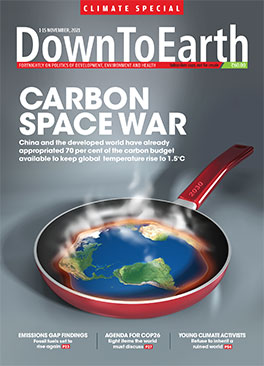 |
 |
CARBON SPACE WAR
China and the developed world have already
appropriated 70 per cent of the carbon budget
available to keep global temperature rise to 1.5°C
- EMISSIONS GAP FINDINGS : Fossil fuels set to rise again
- AGENDA FOR COP26 : Eight items the world must discuss
- YOUNG CLIMATE ACTIVISTS: Refuse to inherit a ruined world
|
|
|
| |
 |
|
| |
| EXTREME WEATHER TRACKER |
| |
Heat waves likely to last ‘25 times longer’ in India by another 2-4 decades, says climate report
|
 |
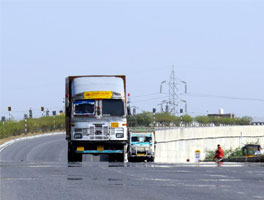 |
|
|
| |
 |
|
| |
 |
 |
Wet winter, harsh summer, weird monsoon: What La Nina has in store for India in 2022, 28 October 2021
|
|
|
| |
 |
|
| |
|
|
| |
 |
|
| |
|
|
| |
 |
|
| |
|
The numbers behind: Climate change, 26 October 2021
|
 |
|
The planet can barely afford any more carbon emissions. But we need to continue to emit for our survival and development. What is the carbon budget available to us? More importantly, who should be allowed to emit and how much? An analysis by Sunita Narain and Avantika Goswami
|
|
|
| |
 |
|
| |
|
|
| |
 |
|
| |
|
|
| |
 |
|
| |
CLIMATE NEWS | SCIENCE| IMPACTS| POLITICS |
|
| |
 |
|
| |
|
|
| |
 |
|
| |
|
|
| |
 |
|
| |
|
|
| |
 |
|
| |
|
|
| |
 |
|
| |
|
|
| |
 |
|
| |
|
|
| |
 |
|
| |
|
|
| |
 |
|
| |
|
|
| |
 |
|
| |
|
|
| |
 |
|
| |
|
|
| |
 |
|
| |
|
|
| |
 |
|
| |
|
|
| |
 |
|
| |
|
|
| |
 |
|
| |
|
|
| |
 |
|
| |
|
|
| |
 |
|
| |
|
|
| |
 |
|
| |
|
|
| |
 |
|
| |
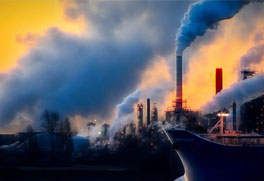 |
 |
|
National targets to limit global warming: Off by a mile, 26 October 2021
|
 |
|
Even enhanced Nationally Determined Contributions are not nearly enough to limit global temperature rise to 1.5°C. Many poor countries, with low annual emissions, have pledged higher targets than rich countries. This is a mockery of the principle of Common but Differentiated Responsibilities and a human rights concern
|
|
 |
|
|
| |
 |
|
| |
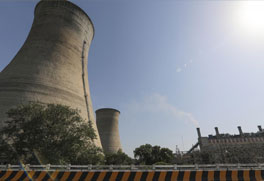 |
 |
|
Then and now: Prime polluters, 26 October 2021
|
 |
|
China, US and EU-27 (excluding the UK) currently emit over 50% of the world’s 36.44 GtCO2 Africa and India, each with 17% of the world’s population, contribute just 4% and 7% The developing world has a right to economic growth without pollution, which requires unprecedented funding
|
|
 |
|
|
| |
 |
|
| |
| Video |
|
Report |
| |
|
|
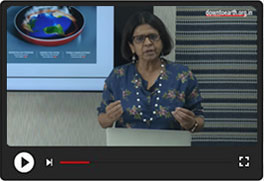
|
 |
|
CoP26 Glasgow: Why equity is key to stopping climate change — Sunita Narain explains
|
|
Watch Video>> |
|
|
|
|
|
| |
|
|